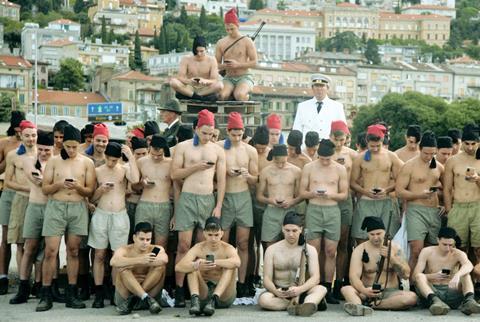Rotterdam’s Tiger winner inventively re-enacts the 1919 occupation of Fiume by Italian poet Gabriele D’Annunzio

Dir/scr. Igor Bezinovic. Croatia/Italy/Slovenia. 2025. 112mins
One of the more bizarre chapters of early 20th century European history – the 1919, 16-month occupation of the city of Fiume (now Rijeka in Croatia) by an Italian celebrity poet-turned-power crazed proto-fascist – is brought to life in this irreverent and wildly entertaining documentary. Director Igor Bezinovic was born in Rijeka, and his playful vision shapes the film. But what makes the project so fresh and unexpected is the involvement of the people of Rijeka, drafted in to participate in re-enactments, provide narration and, in the case of seven men chosen mainly for their lack of hair, to play the central role of the dandy fascist himself, Gabriele D’Annunzio.
A very entertaining, maverick approach to this period
Bezinovic’s dry humour is evident from the outset. During a potted history comparing contemporary Rijeka to the city of the past, he concludes with the laconically delivered line “my Italian colleagues warned me not to mention fascism too much in the intro, for the sake of Italian viewers, so I will stop here.” But the director, whose previous work includes The Blockade, Veruda and A Brief Excursion, is not in the business of tiptoeing around national sensibilities. Fiume O Morte! is forthright, unflinching and very funny. The film, which won the top prize in Rotterdam’s Tiger competition, is a timely reminder that laughing at fascists is a form of resistance and as such, it should be a title of interest for further festivals and arthouse distributors.
Who was Gabriele D’Annunzio? It’s a question that Bezinovic poses to passers by on the streets of Rijeka, some of whom turn up in costume later in the film. Many of those questioned know nothing about him; others know enough to condemn him for his politics. A few are unusually well-informed. D’Annunzio was, in the early 20th century, Italy’s most famous living poet. He was celebrated for his writing, he was notorious for his lavish lifestyle and his numerous lovers. (His popularity with the opposite sex was despite the fact that he was as bald as the Duomo di Firenze, overly fond of cocaine and, according to one of Bezinovic’s ad hoc interviewees, had no teeth).
D’Annunzio was also somewhat bellicose in his opinions on war and combat, critical of other cultures (he wrote of “Slavic bastards” and “filthy Croats”), and was drawn to the military – he signed up to the Italian army, aged 52, following the outbreak of WWI.
His occupation of Fiume is re-enacted, in all its surreal detail, with the participation of some 300 or so present day citizens of the city. It helps that D’Annunzio was impossibly vain and travelled with his own team of photographers and filmmakers, who captured over 10,000 images of his ill-considered campaign. Bezinovic recreates many of these pictures, encouraging a dialogue between the past and the present, and deliberately allowing anachronistic elements to bleed into the historical recreations.
But while it is a very entertaining, maverick approach to this period, the film also makes serious points – not least the way in which history is skewed depending on the lens through which it is viewed. In Rijeka, D’Annunzio is remembered as a fascist, if he is remembered at all. His name, once ubiquitous on the streets, squares and municipal buildings, has been erased. In Italy, however, he is still celebrated as a patriot. Mussolini allegedly compared him to a rotten tooth: “you either pull it out or cover it in gold.” He opted for the latter, awarding D’Annunzio a principality.
This film should go some way towards redressing the balance on D’Annunzio’s legacy. It’s a gloriously punk spin on the historical documentary genre, channeling the humour and rebellious spirit of a people who have been part of “eight or nine different countries” during the 20th century, who have spoken multiple languages, but who have managed to maintain their own distinct identity nonetheless.
Production company: Restart
International sales: Lightdox hello@lightdox.com
Producers: Vanja Jambrovic, Tibor Keser
Cinematography: Gregor Bozic
Editing: Hrvoslava Brkusic
Music: Giovanni Maier, Hrvoje Niksic
Main cast: Izet Medosevic, Cenan Beljulji, Albano Vucetic, Tihomir Buterin, Andrea Marsanich, Massimo Ronzani, Milovan Vecerina Cico
























